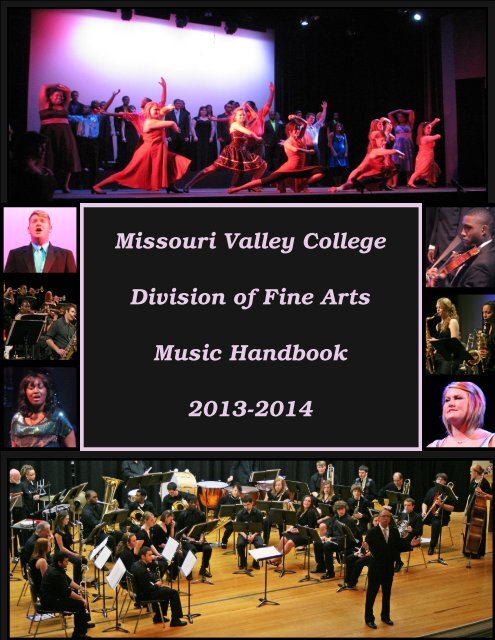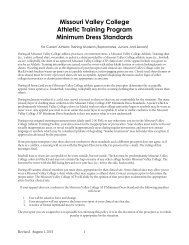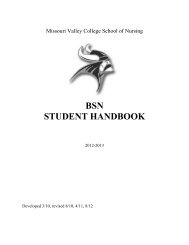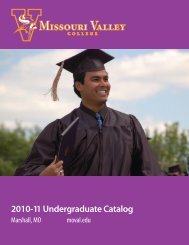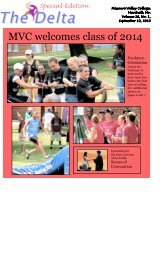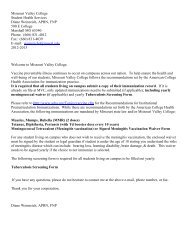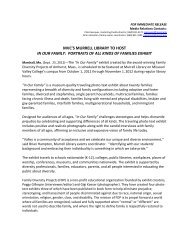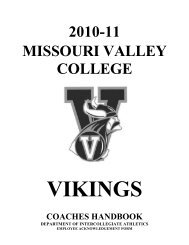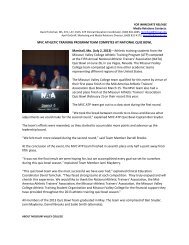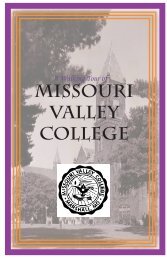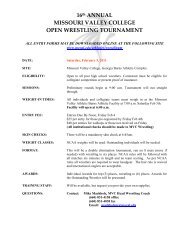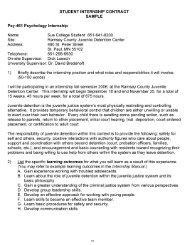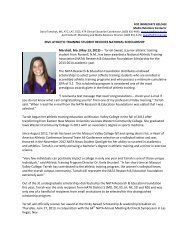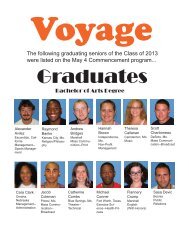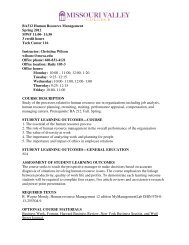2013-2014 Music Handbook - Missouri Valley College
2013-2014 Music Handbook - Missouri Valley College
2013-2014 Music Handbook - Missouri Valley College
You also want an ePaper? Increase the reach of your titles
YUMPU automatically turns print PDFs into web optimized ePapers that Google loves.
<strong>Missouri</strong> <strong>Valley</strong> <strong>College</strong><br />
Division of Fine Arts<br />
<strong>Music</strong> <strong>Handbook</strong><br />
<strong>2013</strong>-<strong>2014</strong>
DIVISION OF FINE ARTS FACULTY<br />
MUSIC FACULTY<br />
Garry Anders<br />
Assistant Professor of <strong>Music</strong><br />
Director, MVC Bands<br />
andersg@moval.edu<br />
831– 4222 - Morrison Fine Art Bld<br />
Diana Malan, Division Chair<br />
Associate Professor of <strong>Music</strong>/Theatre<br />
Director, MVC Choirs<br />
maland@moval.edu<br />
831-4215—Morrison Fine Arts Bldg<br />
Michael Martin<br />
Instructor of <strong>Music</strong><br />
Director, MVC Drumline<br />
martinm@moval.edu<br />
831-4222—Morrison Fine Arts Bldg.<br />
DANCE FACULTY<br />
Janie Morgan<br />
Associate Professor of Dance<br />
Director, MVC Repertory Dance Ensemble<br />
morganj@moval.edu<br />
831-4050—Morrison Fine Arts Bldg<br />
MUSIC ADJUNCT FACULTY<br />
Charles Ferguson<br />
Adjunct Instructor of Applied <strong>Music</strong><br />
fergusonc@moval.edu<br />
Morrison Fine Arts Bldg<br />
Jessica Riggins<br />
Adjunct Instructor of <strong>Music</strong><br />
rigginsj@moval.edu<br />
Milena Simic<br />
Adjunct Instructor of Applied Piano<br />
simic@moval.edu<br />
DANCE ADJUNCT FACULTY<br />
Haley Jameson<br />
Adjunct Instrucotr of Dance<br />
jamesonh@moval.edu<br />
THEATRE ADJUNCT FACULTY<br />
Dyann Rozema<br />
Adjunct Instructor of Theatre<br />
Costume Designer/Shop Supervisor<br />
rozemad@moval.edu<br />
831-4144—Eckilson-Mabee Theatre<br />
THEATRE FACULTY<br />
Harold Hynick<br />
Assistant Professor of Theatre<br />
Director, Flatliners Improv Troupe<br />
hynickh@moval.edu<br />
831-4052—Eckilson-Mabee Theatre<br />
Jay Rozema<br />
Associate Professor of Theatre<br />
Director of Technical Theatre<br />
rozemaj@moval.edu<br />
831-4140—Eckilson-Mabee Theatre<br />
VISUAL ARTS FACULTY<br />
Charity-Mika Woodard<br />
Associate Professor of Visual Art<br />
woodardc@moval.edu<br />
831-4175—Baity Hall Art Studio<br />
VISUAL ARTS ADJUNCT FACULTY<br />
Dan Gemkow<br />
Adjunct Instructor of Visual Art<br />
gemkowd@moval.edu<br />
Matt Moyer<br />
Adjunct Instructor of Graphic Design<br />
moyerm@moval.edu<br />
Valerie Wedel<br />
Adjunct Instructor of Visual Art<br />
wedelv@moval.edu<br />
831– 4207 - Young Hall Ceramics Studio<br />
http://www.moval.edu/fine_arts/index.php<br />
2
PERFORMANCE OPPORTUNITIES<br />
Each year the Division of Fine Arts offers a production season that consists of musicals, plays,<br />
choral music shows, instrumental & choral concerts, dance concerts, and student music<br />
recitals. All interested students are invited to participate.<br />
Requirements for production involvement:<br />
Must maintain a 2.0 cumulative GPA<br />
Must have a 2.0 GPA during previous semester<br />
MVC Choirs offer a variety of vocal opportunities for students. There are three choral groups for<br />
students to participate in: <strong>Valley</strong> Connection show choir, MVC Concert Choir and <strong>Valley</strong> Voices (vocal jazz<br />
group). Each choral group has their own diverse style and are open to all interested students. Small<br />
ensemble and solo work are also offered within the choirs. The groups present annual Christmas and<br />
Spring Shows. Tour performances are also scheduled throughout the school year. Scholarships are<br />
available to qualified students. For more information contact Professor Diana Malan (660) 831-4215<br />
(Director, MVC Choirs)<br />
MVC Instrumental program offers the following groups: Concert Band, Jazz Band, and Drumline. A<br />
variety of small ensembles and solo work are also available to students. The Concert and Jazz Bands<br />
present concerts throughout the school year. Drumline performs at home football games. Scholarships<br />
are available to qualified tudents. For more information contact Professor Garry Anders (660) 831-4222<br />
(Director, MVC Bands)<br />
MVC Repertory Dance Ensemble provides performance, choreographic and pre-production<br />
opportunities for our students throughout the year. The ensemble's broad repertory consists of modern,<br />
jazz, ballet, tap, hip-hop and ethnic dance works. Collaborations with musicians, guest artists<br />
and community members provides students with excellent pre-professional dance experience.<br />
Scholarships are available to qualified students. For information on upcoming performances see the<br />
Production Calendar. For more information please contact Professor Janie Morgan (660) 831-4050<br />
(Artistic Director and Choreographer)<br />
Flatliners (MVC’s own Improvisational Comedy Troupe) were founded in 2001 and ever since, their<br />
performances have been a favorite of <strong>Valley</strong>’s theatrical offerings. The students involved put on a monthly<br />
formatted improvisation show for the campus and community. Scholarships are available to qualified<br />
students. If you are interested in participating in “The Flatliners,” booking the group to perform, or would<br />
just like more information contact Profess Harold Hynick (660) 831-4052 (Director)<br />
MET (Morris Experimental Theatre) is designed for intimate productions, student directing and acting<br />
projects. Throughout the school year full length plays, one act plays, original plays, and student<br />
generated projects are presented in the space. The studio is open to all interested students. For more<br />
information contact Professor Harold Hynick (660-831-4052)<br />
3
CHORAL AND INSTRUMENTAL ENSEMBLES<br />
VALLEY<br />
CONNECTION<br />
SHOW CHOIR<br />
A choreographed<br />
choir with repertoire<br />
consisting of<br />
contemporary music in the<br />
show-pop style. Auditions are<br />
required. Selected members<br />
are expected to make a<br />
commitment for the<br />
school year.<br />
MVC JAZZ BAND<br />
Study and performance of<br />
traditional and progressive<br />
jazz-rock music.<br />
MVC CONCERT CHOIR<br />
A choral ensemble open to<br />
all interested singers.<br />
Repertoire includes foreign<br />
language, sacred,<br />
Broadway, contemporary,<br />
and concert/festival.<br />
MVC DRUMLINE<br />
Appears at all home football<br />
games and playoff games. Eight<br />
week study of cadences and<br />
fundamentals of playing<br />
percussion instruments<br />
MVC CONCERT BAND<br />
VALLEY VOICES<br />
A vocal ensemble that<br />
focuses on jazz and<br />
acappella styles of music.<br />
Auditions are required.<br />
Selected members are<br />
expected to make a<br />
commitment for the<br />
school year.<br />
Open to any instrumentalist with<br />
performing ability on a band<br />
instrument. The band performs<br />
original band literature and<br />
transcriptions of many famous works.<br />
4
DEGREES/ACADEMIC CRITERIA/EXPECTATIONS<br />
Expectations for Students in the Division of Fine Arts:<br />
Attend all classes<br />
Complete all assignments on time, and as directed<br />
Follow through on commitments<br />
Maintain focus on the task at hand<br />
Give your best efforts to all you undertake<br />
Academic Criteria for participation in productions and performance groups:<br />
Maintain an overall GPA of no less than 2.0<br />
Have a semester GPA of no less than 2.0<br />
Provide proof of current and overall GPA at all auditions<br />
Provide proof of class attendance and coursework at all auditions<br />
**Productions include all mainstage and black box shows<br />
**Performance groups include Show Choir, Repertory Dance Ensemble, Flatliners, and Instrumental audition groups.<br />
Criteria for acceptance into and maintaining enrollment in teacher education:<br />
Overall GPA of 2.75 or higher or 2.5 with an ACT score of 20 or higher<br />
Grade of “C” or higher in ED 100<br />
Qualifying scores of 235 or higher on every subtest area of the C-Base exam<br />
Evidence of competency in written and oral communication to be judged through EN 160 (“C” or higher grade) and SP 100<br />
(“C” or higher grade)<br />
Praxis exam must be passed prior to student teaching.<br />
DEGREES:<br />
BS (Bachelor of Science)<br />
The BS degree requires more coursework in math/science rather than language/literautre.<br />
BA (Bachelor of Arts)<br />
The BA degree is appropriate for students who plan to major in Dance, General Theatre or<br />
General <strong>Music</strong>. Art and <strong>Music</strong> Education students may also elect to pursue the B.A. degree.<br />
The degree requires more coursework in the language/literature area.<br />
5
MVC GENERAL EDUCATION CORE CURRICULUM<br />
New core effective for 2012-<strong>2013</strong> school year<br />
6
MVC GENERAL EDUCATION CORE CURRICULUM<br />
B.A.—Bachelor of Arts; B.S.Bachelor of Science; B.F.A.—Bachelor of Fine Arts<br />
7
GENERAL MUSIC<br />
41 Total Hours<br />
COURSE SEMESTER GRADE REPEAT<br />
MU 110: Class Piano I (1) Fall _______________ __________ __________<br />
MU 111: Class Piano II (1) Spring _______________ __________ __________<br />
APPLIED LESSONS: (4 HRS—must concentrate in one area): MU 140, MU 145, MU 146, MU 147<br />
Fall, Spring _______________ __________ __________<br />
_______________ __________ __________<br />
_______________ __________ __________<br />
_______________ __________ __________<br />
ENSEMBLE WORK (4 HRS—majors must participate in a music ensemble every semester): MU 170, MU 178<br />
Fall, Spring _______________ __________ __________<br />
_______________ __________ __________<br />
_______________ __________ __________<br />
_______________ __________ __________<br />
MU 250: <strong>Music</strong> Theory I (3) Fall _______________ __________ __________<br />
MU 252: Aural Training I (1) Fall _______________ __________ __________<br />
MU 251: <strong>Music</strong> Theory II (3) Spring _______________ __________ __________<br />
MU 253: Aural Training II (1) Spring _______________ __________ __________<br />
MU 320: <strong>Music</strong> Theory III (3) Fall _______________ __________ __________<br />
MU 321: <strong>Music</strong> Theory IV (3) Spring _______________ __________ __________<br />
MU 350: Conducting I (2) Fall even _______________ __________ __________<br />
MU 351: <strong>Music</strong> Composition (3) Spring even _______________ __________ __________<br />
MU 370: <strong>Music</strong> History I (3) Fall odd _______________ __________ __________<br />
MU 371: <strong>Music</strong> History II (3) Spring odd _______________ __________ __________<br />
Senior Seminar (1) Fall, Spring _______________ __________ __________<br />
5 HRS Upper Division Elective Hours: approval of advisor<br />
MU __________ ____________________________ _______________ __________ __________<br />
MU __________ ____________________________ _______________ __________ __________<br />
8
MUSIC EDUCATION—CHORAL (K-12)<br />
48 Total Hours<br />
COURSE SEMESTER GRADE REPEAT<br />
MU 110: Class Piano I (1) Fall _______________ __________ __________<br />
MU 111: Classd Piano II (1) Spring _______________ __________ __________<br />
APPLIED LESSONS: (6 HRS—must concentrate in primary area): F/S: MU 140<br />
ENSEMBLE WORK (6 HRS—majors must participate in a music ensemble every semester): F/S: MU 170<br />
MU 250: <strong>Music</strong> Theory I (3) Fall _______________ __________ __________<br />
MU 252: Aural Training I (1) Fall _______________ __________ __________<br />
MU 251: <strong>Music</strong> Theory II (3) Spring _______________ __________ __________<br />
MU 253: Aural Training II (1) Spring _______________ __________ __________<br />
MU 320: <strong>Music</strong> Theory III (3) Fall _______________ __________ __________<br />
MU 321: <strong>Music</strong> Theory IV (3) Spring _______________ __________ __________<br />
MU 350: Conducting I (2) Fall even _______________ __________ __________<br />
MU 352: Conducting II (2) Spring even _______________ __________ __________<br />
MU 360: Choral Techniques (2) Fall even _______________ __________ __________<br />
MU 362: Choral Literature (2) Spring even _______________ __________ __________<br />
MU 370: <strong>Music</strong> History I (3) Fall odd _______________ __________ __________<br />
MU 371: <strong>Music</strong> History II (3) Spring odd _______________ __________ __________<br />
MU 385: Choral Arranging (2) Spring odd _______________ __________ __________<br />
MU 460: Methods for Tchg Elem Sch <strong>Music</strong> (2) F _______________ __________ __________<br />
MU 461: Methods for Tchg Mid/Sec Sch <strong>Music</strong> (2) F _______________ __________ __________<br />
**<strong>Music</strong> Education majors must pass a piano proficiency exam (see page 14)<br />
**<strong>Music</strong> Education majors must complete the professional education courses (see page 11)<br />
**See page 5 for acceptance into the teacher education program<br />
9
MUSIC EDUCATION—INSTRUMENTAL (K-12)<br />
48 CREDIT HOURS<br />
COURSE SEMESTER GRADE REPEAT<br />
MU 110: Class Piano I (1) Fall _______________ __________ __________<br />
MU 111: Class Piano II (1) Spring _______________ __________ __________<br />
APPLIED LESSONS: (6 HRS—must concentrate in primary area): F/S: MU 145, MU 146<br />
ENSEMBLE WORK (4 HRS—majors must participate in a music ensemble every semester): F/S: MU 178<br />
MU 210: String Techniques (1) Fall even _______________ __________ __________<br />
MU 211: Woodwind Techniques I (1) Spring even _______________ __________ __________<br />
MU 212: Woodwind Techniques II (1) Spring odd _______________ __________ __________<br />
MU 213: Brass Techniques I (1) Spring even _______________ __________ __________<br />
MU 214: Brass Techniques II (1) Spring odd _______________ __________ __________<br />
MU 215: Percussion Techniques (1) Fall odd _______________ __________ __________<br />
MU 250: <strong>Music</strong> Theory I (3) Fall _______________ __________ __________<br />
MU 252: Aural Training I (1) Fall _______________ __________ __________<br />
MU 251: <strong>Music</strong> Theory II (3) Spring _______________ __________ __________<br />
MU 253: Aural Training II (1) Spring _______________ __________ __________<br />
MU 320: <strong>Music</strong> Theory III (3) Fall _______________ __________ __________<br />
MU 321: <strong>Music</strong> Theory IV (3) Spring _______________ __________ __________<br />
MU 350: Conducting I (2) Fall even _______________ __________ __________<br />
MU 352: Conducting II (2) Spring even _______________ __________ __________<br />
MU 370: <strong>Music</strong> History I (3) Fall odd _______________ __________ __________<br />
MU 371: <strong>Music</strong> History II (3) Spring odd _______________ __________ __________<br />
MU 380: Instrumental Arr (2) Fall odd _______________ __________ __________<br />
MU 460: Methods for Tchg Elem Sch <strong>Music</strong> (2) F _______________ __________ __________<br />
MU 462: Methods for Tchg Mid/Sec Sch <strong>Music</strong> (2) F _______________ __________ __________<br />
**<strong>Music</strong> Education majors must pass a piano proficiency exam (see page 14)<br />
**<strong>Music</strong> Education majors must complete the professional education courses (see page 11)<br />
**See page 5 for acceptance into the teacher education program<br />
10
PROFESSIONAL EDUCATION COURSES<br />
COURSE SEMESTER GRADE REPEAT<br />
ED 100: Intro to Teaching (3) _______________ __________ __________<br />
ED 191: Secondary Practicum I (1) _______________ __________ __________<br />
ED 260: Ed of the Exceptional Child (3) _______________ __________ __________<br />
ED 300: Instructional Methodology (3) _______________ __________ __________<br />
ED 311: Educational Psychcology (3) _______________ __________ __________<br />
ED 322: Teaching Reading in content area (2) _______________ __________ __________<br />
ED 335: Interp of Ed Tests and Measurements (3) _______________ __________ __________<br />
ED 206: Beginning Portfolio Development (1) _______________ __________ __________<br />
ED 306: Intermediate Portfolio Development (1) _______________ __________ __________<br />
ED 406: Advanced Portfolio Development (1) _______________ __________ __________<br />
ED 307: Classroom Org & Management (2) _______________ __________ __________<br />
ED 352: Secondary Clinical Experience (2) _______________ __________ __________<br />
ED 415: Student teaching Seminar (1) _______________ __________ __________<br />
ED 491: Student Teaching (6-12) _______________ __________ __________<br />
ED 44x: Tech of Teaching <strong>Music</strong> (2) _______________ __________ __________<br />
PY 275: Adolescent Psychology (3) _______________ __________ __________<br />
MU 110: Class Piano I<br />
MU 111: Class Piano II<br />
OR 2 semesters of MU 147 (Applied Piano)<br />
MU 250: <strong>Music</strong> Theory I<br />
MU 252: Aural Training I<br />
MU 251: <strong>Music</strong> Theory II<br />
MU 253: Aural Training II<br />
MU 370 or MU 371: <strong>Music</strong> History I or II<br />
Applied Lessons: 2 credit hours<br />
Ensemble work: 2 credit hours<br />
5 elective hours: 300/400 level<br />
MUSIC MINOR<br />
22 total hours<br />
**<strong>Music</strong> majors/minors are required to participate in a music ensemble every semester.<br />
11
STUDENT JURY INFORMATION<br />
All students pursuing degrees in the Division of Fine Arts are required to participate in yearly<br />
Student Juries. This is an opportunity for students to review their artistic background reflecting on<br />
what they’ve gained/learned throughout each experience.<br />
Juries are part of your required yearly assessment process which must be completed for approval of<br />
graduation. It is an opportunity to get feedback from your faculty/panel members, to set goals for<br />
yourself, and to learn more about where you are in your devleopment.<br />
INSTRUMENTAL JURIES<br />
Juries serve the following purposes:<br />
Provides feedback to students on a per semester basis<br />
Provides information to instructors regarding the quality of their teaching<br />
Provides performance opportunities for students each semester<br />
Juries will take place each semester on or near the final day of class with an assigned time<br />
All instrumental music majors must play at every jury<br />
All students taking applied lessons must play at each jury for the semester they are enrolled in<br />
lessons<br />
Juries of music majors not taking applied lessons will consist of<br />
* scales including chromatic, major, and minor<br />
* prepared piece of not less than four and no more than 6 minutes<br />
* brief sight reading piece<br />
* verbal and written feedback from at least four faculty members<br />
Juries of music majors taking applied lessons will consist of<br />
* scales including chromatic, major, minor, modes, and diminished based on number of previous<br />
applied lesson semesters<br />
* prepared piece or pieces not less that six minutes no more than eight<br />
* sight reading<br />
* 30 percent of final applied lesson grade will consist of jury grade<br />
* verbal and written feedback from at least four faculty members<br />
Jury for non music majors taking applied lessons will consist of<br />
* scales<br />
* prepared piece of not less than three minutes, no more than five<br />
* brief sight reading<br />
* 30 percent of final applied lesson grade will consist of jury grade<br />
* verbal and written feedback from at least four faculty members<br />
Note: Beginning Spring of <strong>2013</strong>, pre-requisite for enrollment in applied lessons is participation in<br />
the previous semester jury.<br />
12
STUDENT JURY INFORMATION<br />
VOCAL JURIES<br />
Freshmen, Sophomore, and Juniors do Vocal Juries<br />
Seniors will present a full recital with Senior Seminar<br />
Student Juries will take place in March (the week prior to Spring Break)<br />
JURY REQUIREMENTS:<br />
Perform two contrasting vocal selections: (limit of 5- 6 minutes)<br />
*Your selections should demonstrate your vocal abilities, including range, dynamics, tempo,<br />
diction, interpretation, etc.<br />
Score/Song Analysis:<br />
*A complete score/song analysis must be submitted for each vocal selection<br />
Sight Reading/Ear Training:<br />
*You will be given a brief piece to sight read<br />
*You will be given ear training exercises to do<br />
Resume/Transcript:<br />
*A current resume and transcript must be submitted<br />
Panel Interview:<br />
*Faculty and guest panelists will provide feedback regarding your performance and sight<br />
reading.<br />
*Be prepared to answer questions regarding your performance, score analysis, and college<br />
progress.<br />
MISSION STATEMENT/LEARNING OUTCOMES<br />
<strong>Music</strong> Mission Statement: The <strong>Missouri</strong> <strong>Valley</strong> <strong>College</strong> <strong>Music</strong> program is committed to<br />
developing the full potential of students by providing a personalized, hands-on learning<br />
environment that fosters an appreciation and understanding of music: that encourages musical<br />
creativity and artistic expression; that provides a variety of musical opportunities; and that offers<br />
an integrated curriculum which prepares students for teaching, graduate school, or careers in music.<br />
Learning Outcomes:<br />
* Students will have a solid grounding in music history, music literature, and music theory.<br />
* Students will have a solid understanding of the collaborative process.<br />
* Students will demonstrate the ability to use critical ideas, interpretations, and judgments orally<br />
and in writing.<br />
* Students will develop an understanding of aesthetic qualities.<br />
* Students will demonstrate the ability to apply proper technical skills in their music.<br />
13
PIANO PROFICIENCY EXAM<br />
<strong>Music</strong> Education Majors<br />
All music education major students must pass a piano proficiency exam to be certified<br />
by the state of <strong>Missouri</strong> to teach music.<br />
The following materials must be performed:<br />
*All 12 major scales, three octaves with arpeggios in quarter notes at quarter note<br />
equals 120. The Arpeggios are to be played as half notes.<br />
*All 12 melodic minor scales, three octaves with arpeggios in quarter notes at quarter<br />
note equals 120. The Arpeggios are to be played as half notes.<br />
*A church hymn (student’s choice)<br />
*A Bach Chorale (students’ choice)<br />
*“Minuet” by Luigi Boccherini in E Major<br />
*“Prelude and Fugue” by Johann Bach, Book 1, No. 2 from “The Well Tempered Clavier”<br />
*A short sight reading example<br />
Proficiency may be taken during the last three weeks of any semester selected by the student.<br />
The date and time of the exam must be made by midterm of that semester with Garry Anders or<br />
Diana Malan. The date and time must be agreed upon by all parties, in writing. Students will be<br />
judged by three faculty members and must pass at least 80 percent of the requirements in order<br />
to have passed the proficiency exam.<br />
If a student fails the exam (less than 80%), he/she may request another opportunity to attempt<br />
the proficiency. This may occur in the following semester two weeks before midterms.<br />
14
CODE OF CONDUCT<br />
The faculty of the Division of Fine Arts wishes to instill the highest level of<br />
discipline and professionalism in future artists.<br />
In that spirit, we have adopted the following:<br />
AN ARTIST’S CODE OF CONDUCT:<br />
<br />
<br />
<br />
<br />
<br />
I will honor my personal creativity by expressing myself to the greatest ability.<br />
I am an integral part of the creative process and will function as an inventive<br />
collaborator. There is a time to give creative input and a time to take notes. I will<br />
learn the difference.<br />
I will take direction and constructive criticism from my director, teacher, or supervisor<br />
in the spirit they are given, knowing they serve to help me become a more powerful<br />
presence on stage or in the classroom.<br />
I will be emotionally ready and physically prepared to work when rehearsal or<br />
class begins.<br />
I will bring solutions, not problems to every rehearsal and class project.<br />
Love the art in yourself and not yourself in the art.<br />
Remember: there are no small parts, only small actors.<br />
Never come into the theatre or classroom with mud on your feet. Leave your dust and dirt outside.<br />
Check your little worries, squabbles, petty difficulties with your outside clothing -- all the things<br />
that ruin your life and draw your attention away from your art -- at the door.<br />
-Konstantin Stanislavski-<br />
15


